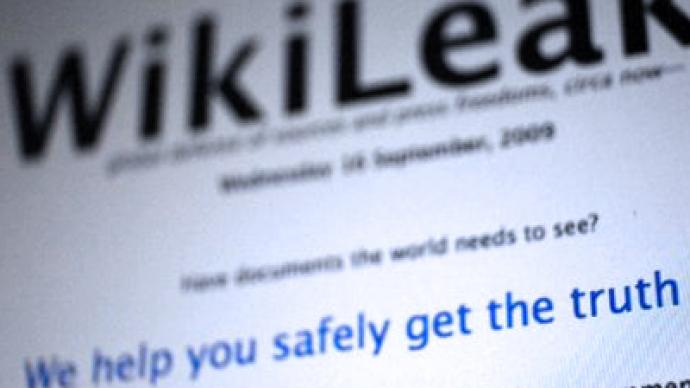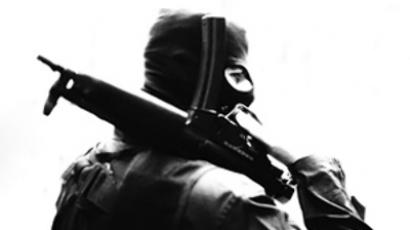WikiLeaks releases new portion of classified data

The world's biggest media outlets, including The Guardian, The New York Times and Le Monde, have published the first of a new batch of secret materials obtained by WikiLeaks.
This time it contains messages from US diplomats stationed around the world, which could become a huge blow for US diplomacy and the State Department. In total there are over 250,000 classified documents, cables between US diplomats from all over the world and state orders from the US government. The documents concern most of America’s key allies, including some countries of Central Asia, the Middle East, Europe, and, also, Russia. If the published information proves to be true, it may seriously harm the United States’ image.According to some of the documents published by WikiLeaks, American authorities gave orders to spy on some top foreign officials, including the UN Secretary General, which involved gathering information about their bank accounts. Other documents mentioned embarrassing political nicknames given by American diplomats to the leaders of their host countries: Nicolas Sarkozy is referred to as a “naked emperor”, Russian Prime Minister Vladimir Putin as an “alpha-dog” and the tandem of Medvedev and Putin is characterized as a “Batman and Robin” relationship.Among the most controversial documents are those related to the war in South Ossetia in 2008 that allegedly prove that the US knew in advance that Georgia had been planning an attack on South Ossetia.
Russia's reaction
So far, the reaction of Russian authorities has been quite soft. The President’s press secretary reported that the Kremlin did not find anything interesting in the documents and compared them with Hollywood stories. The Prime Minister’s press service said it was too early to make any comments or draw conclusions as the information still has to be studied and checked. The Russian Foreign Ministry reacted by saying that the documents are not going to change the course of Russian-American relations. The relations between the two countries are and will be built strictly on their own actions.“It was fun to read, sure. But in actual policies we prefer to base our decisions on our partners’ concrete actions. We are planning to practice this approach in the future,” Russian Foreign Minister Sergey Lavrov said.You can read more about the WikiLeaks revelations and also Russia’s reaction to them here
The leak may have come from the State Department itself
The controversy and the caliber of the information have led some political analysts to the conclusion that it could only have leaked from the State Department itself, which puts its efficiency under question. Vitaly Leibin, the chief editor of Russian Reporter, a magazine which claims to officially collaborate with WikiLeaks, also believes that the leaks are the result of people inside the US government wanting the information exposed. "These leaks would never have happened if not for the number of insiders who are ready to leak this information. It looks like it’s linked to the wars in Iraq and Afghanistan when officers understood that they are working for a not exactly fair business, and this moral decay inside the Pentagon caused these leaks,” he said. “The main thing this leak has done is break the illusion that the State department has everything under control. There have been exposed mechanisms – not secret, but quite simple and cynical. Partners of the US will be more careful now. It’s another sign that the US is no longer dominating the world,” he added.What the WikiLeaks incident shows is how the whole intelligence community has become over-reliant on technology, said former intelligence officer Glenmore Trenear-Harvey. He pointed out the inherent problems with the Secret Internet Protocol, a system of networks used by the US Defense and State Departments to transmit classified information that is one of the alleged sources of the leak. “The idea was for an exchange of information after 9/11, when the intelligent services weren’t sharing their information together,” he said. “Now what has happened is that whereas maybe 40,000 people within the intelligence community would have access, suddenly, bizarrely, diplomats, military people and, indeed, intelligence people – there’s over 2 million people that had access to it.”
The publication means more than the revelations themselves
Interestingly enough, many experts are not discussing the very content of the newly published leaks, but what the leaking of this latest publication actually means. They claim the security measures are not what they used to be.They also discuss the possible consequences of this latest leak. Some wonder whether US diplomacy will now suffer. Others ask if foreign officials may be less willing to cooperate with US diplomats out of fear that their conversations and sensitive information may be published on newspaper websites the next day.“It’s a product of the information age but it compromises the ability of countries to conduct international relations. Without some secrecy it would be impossible to conduct negotiations,” said Eitan Gilboa of the Center for International Communication in Israel.However, Philip Giraldi, the head of the Council for the National Interest and a former CIA officer, says that these events will not change relations between the US and other countries.“I do not think it is going to have any impact at all. I think there are certain individuals, who have been embarrassed by the leak of the documents, that named them. But the fact is that dialogue between the US and between the senior officials in other countries around the world is because there is a mutual interest of having those dialogues, and those dialogues will continue. There will be a little bit of a chill, but I think after the chill is over, it will be pretty much business as usual,” Giraldi told RT.
Some analysts claim that the information published by WikiLeaks has already been known in diplomatic circles and comes as no surprise. “It’s important to say I’m not sure how many new things are going to be revealed by the documents,” Gilboa added. “We know, pretty much, most of what the United States thinks… The embarrassing thing would be to see it in print on official documents.”Everything that Washington touches they turn to ruin and the new leak of classified information is just another example of their level of incompetence, claims trend forecaster Gerald Celente from New York. WikiLeaks is a new form of journalism for the 21st century, he said.“We, the people, should have the right to this information,” declared Celente. “They want a transparent government – let’s have it!”
The country should not be judged by its internal diplomatic documents
John Gearson, a terrorism and foreign policy expert at King's College, warns that the files published by the website do not necessarily reflect the country's policy.“Taken out of context, these documents might give a misleading picture,” Gearson said.“If we just take one document and say, it says this rude thing about this leader… this doesn’t necessarily mean it’s this country’s policy, it means that’s one insight.” “Just putting out information into the public domain doesn’t always lead to better policy and better governments; it can sometimes lead to an unintended outcome,” he pointed out.
Sergey Strokan, political columnist at Russia’s Kommersant newspaper, agrees that it is better not to jump to conclusions over the leaked documents:“We have to keep in mind that whatever classified documents are released – they are just raw material of diplomacy. And you can’t judge the actions of the country and their policies just by documents which are meant for domestic diplomatic consumption,” Strokan told RT. As for the timing of the leak, Strokan argues this could be “an ongoing attack on President Obama, which did not start today and which aims at preventing him from re-election."
Diplomacy should not be a synonym for duplicity, and honesty is the best policy in the long run, says Craig Murray, a former British ambassador to Uzbekistan. In the end, the governments face big embarrassment when their double standards are exposed by such leaks. “Far too many documents are over-classified when a more straightforward and honest approach would remove a need for that,” he added. “And remember, the public is paying for everything. International relations are conducted in the name of the people – and people really have a right to know what is going on.”
The US is already trying to minimize the damage, and the Obama administration has ordered state agencies to review the procedures on how to guard secret documents.Secretary of State Hillary Clinton claimed the information revealed by WikiLeaks does not represent the official position of the US, but simply the personal viewpoint of its diplomats.“I want to make clear that our official foreign policy is not set through these messages, but here in Washington,” she said. “Our policy is a matter of public record, as reflected in our statements and our actions around the world.”Nevertheless, Clinton, who is planning official visits to some of America’s allies in the near future, is likely to face a challenge in explaining the whole situation. The US State Department said in a previous statement that the leak could endanger lives and cause permanent damage to foreign relations.One senator has even called on the US State Department to include WikiLeaks on its list of terrorist organizations.However, William Spring, an anti-government campaigner and director of the Cana UK Monitoring Group, believes the argument that WikiLeaks has harmed US national security is entirely specious. He also thinks that diplomacy has been relegated over the years, and that the information contained in the most recent leaks is not as important as the previous WikiLeaks publication of information about the wars in Iraq and Afghanistan. “All serious decisions are not taken via diplomatic cables, or via embassies,” he told RT.
On Sunday, the US government demanded WikiLeaks return millions of classified documents and warned its founder, Julian Assange, of the possible danger publication would pose for “countless” individuals.On the same day, several hours before the announced time of publication, the whistleblower's website was reportedly attacked by hackers.According to WikiLeaks, the latest revelations are only the beginning.The website has become famous for its previous publication of classified documents concerning the wars in Iraq and Afghanistan.













